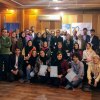
Opening up, Iran has opportunity to commercialize its science and technology skills
Opening up, Iran has opportunity to...
Since 2005, when UNCTAD last assessed the country's policies on science, technology and innovation (STI), Iran has had one of the world's fastest growing scientific outputs, climbing from 34th to 16th position in terms of scientific publications.
Its population now has the world’s second-highest number of engineer graduates per capita, says UNCTAD's new Science, Technology and Innovation Policy Review for Iran.
"Iran’s impressive human resources position it well to seize the opportunity of reconnecting with the global economy, and its policies on science, technology, and innovation will be critical to its success,” said Shamika Sirimanne, Director of UNCTAD's Division on Technology and Logistics.
"UNCTAD is happy to support and to work with Iran at this important moment in their history," Ms. Sirimanne said ahead of the report’s launch in Tehran on Tuesday, december 6th.
Iran has shown it can do top-notch research and work with technology, even in emerging sectors like nanotech, but the challenge now is to commercialize this knowledge, the report finds.
In place since 1980 and strengthened in 2008, sanctions may have limited Iran's access to foreign finance, technologies and markets, but they also forced the country to become self-reliant. Iran is now the most economically diverse oil-producing country in West Asia.
With global trade growing at its slowest pace since the financial crisis began, businesses are seeking new opportunities for growth, and Iran’s $400 billion economy holds the promise of a lucrative market of nearly 80 million consumers.
Iran will face serious competition from foreign companies. Good policy can facilitate more innovation by Iranian companies, helping to boost growth and create more jobs.
Tehran has taken important steps since 2005 to put in place the right policies on science, technology and innovation, the report says, but needs to better align these with other key policy areas such as trade, investment, industrial development, education, and competition.
Foreign direct investment, for example, will be most useful for Iran if it leads to genuine collaboration on technology and innovation, rather than just an increase in productivity.
To create an environment where innovation and creativity can flourish, Iran needs to strengthen systems that support innovation. And this entails promoting collaboration between industry and universities and research institutes, and strengthening the business environment, for example.
This is a summary of the report, for more details, go to:
http://unctad.org/en/pages/newsdetails.aspx?OriginalVersionID=1401
 Reload
Reload



